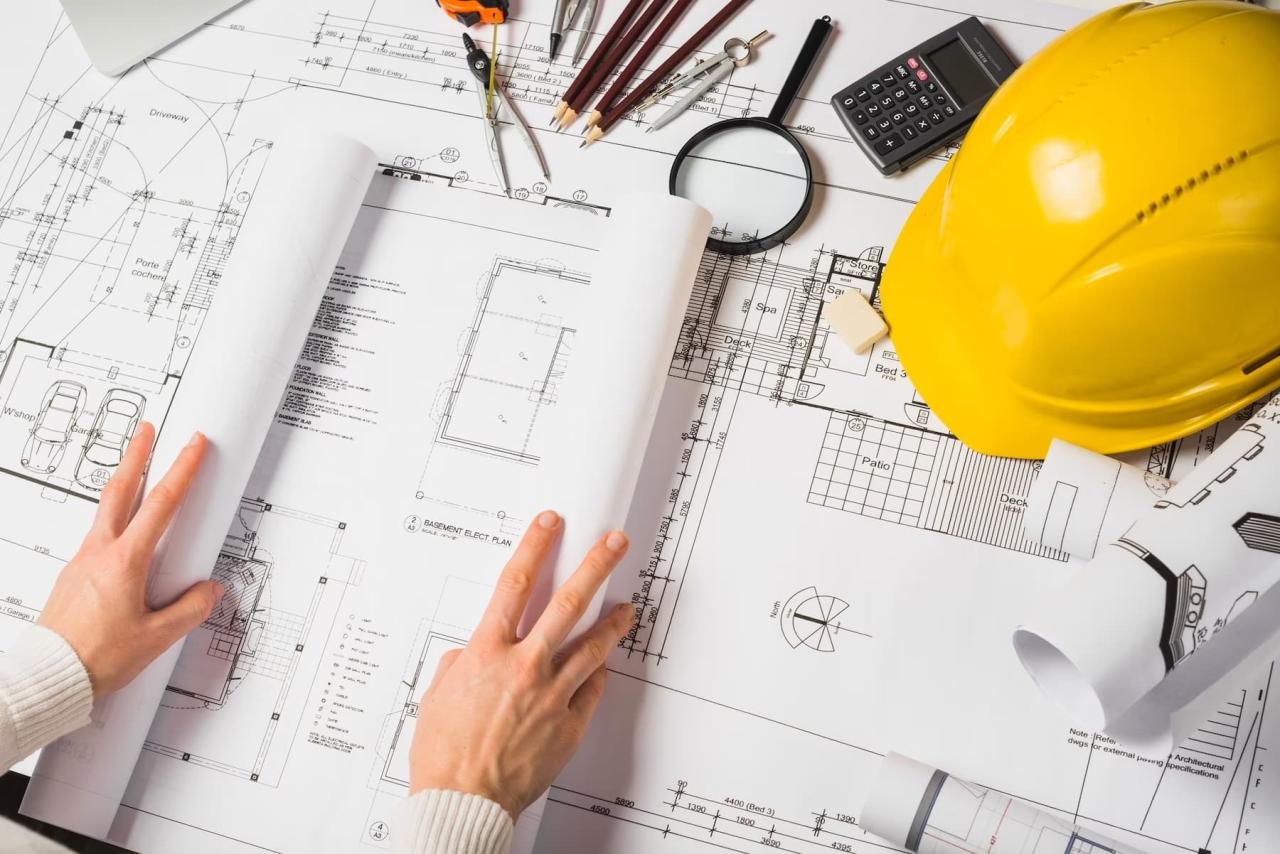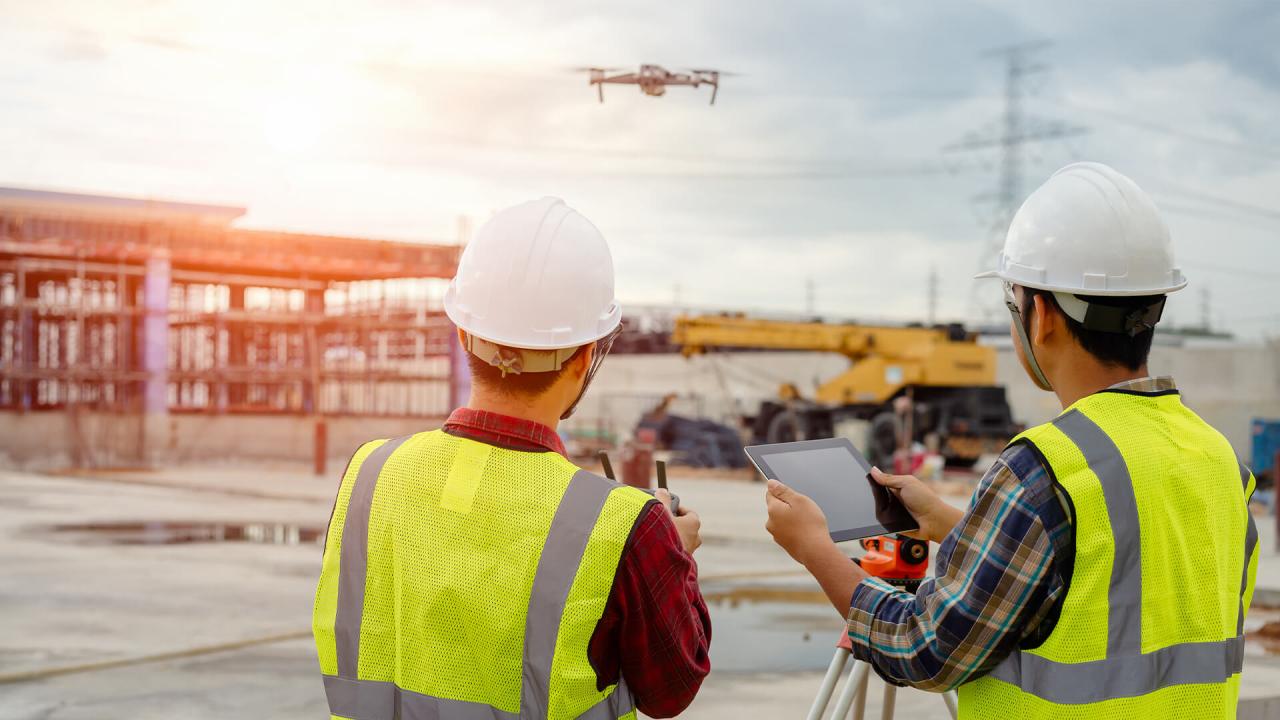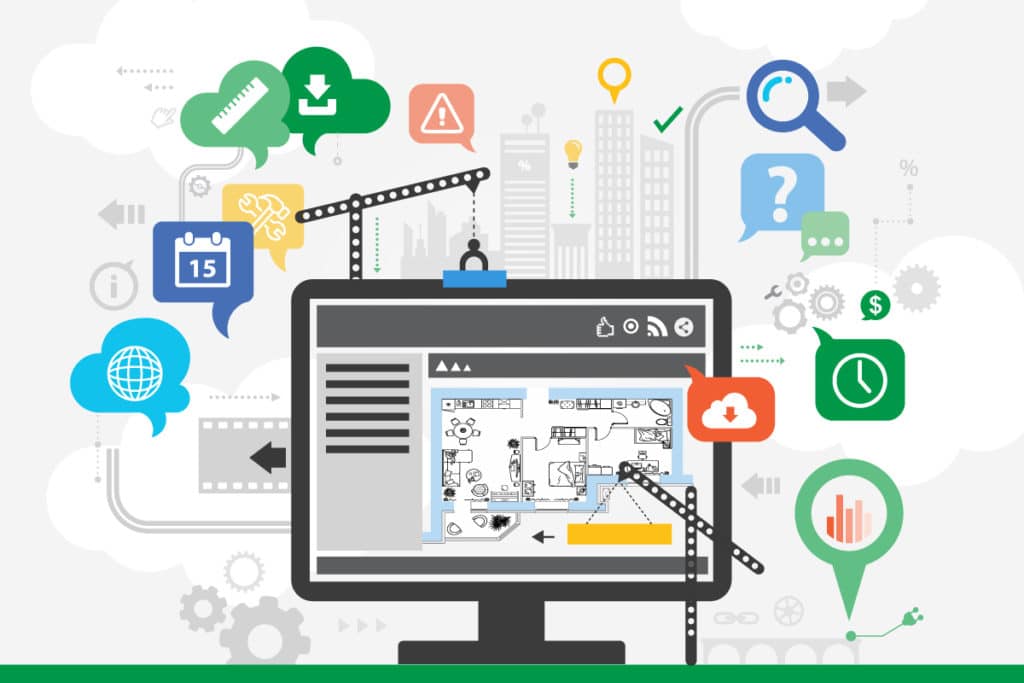Construction Technology Trends: Shaping the Future of Building
Construction technology trends are revolutionizing the way we build, from the materials we use to the processes we employ. This shift is driven by the need for increased efficiency, safety, […]

Construction technology trends are revolutionizing the way we build, from the materials we use to the processes we employ. This shift is driven by the need for increased efficiency, safety, and sustainability in the construction industry.
These trends encompass a wide range of advancements, including automation and robotics, Building Information Modeling (BIM), advanced materials, and digital technologies. Each of these areas offers unique opportunities to enhance construction practices and create innovative solutions for the built environment.
Internet of Things (IoT) in Construction
The Internet of Things (IoT) is revolutionizing the construction industry by connecting devices, sensors, and systems to collect and analyze data in real-time. This connectivity empowers construction professionals to make informed decisions, optimize processes, and enhance safety and sustainability on construction projects.
Role of IoT Devices and Sensors
IoT devices and sensors play a crucial role in gathering real-time data on various aspects of construction projects. These devices can monitor environmental conditions, track equipment, and manage energy consumption.
- Environmental Monitoring: Sensors can monitor temperature, humidity, air quality, and other environmental factors. This data helps ensure optimal working conditions, prevent delays due to adverse weather, and promote worker safety.
- Equipment Tracking: GPS trackers and RFID tags can track the location and status of construction equipment. This enables real-time monitoring of equipment utilization, maintenance scheduling, and theft prevention.
- Energy Management: Smart meters and sensors can monitor energy consumption in buildings and construction sites. This data can help optimize energy usage, reduce costs, and promote sustainability.
Benefits of IoT in Construction
IoT technology offers numerous benefits for construction projects, including increased efficiency, improved safety, and enhanced sustainability.
- Improved Efficiency: By providing real-time data and insights, IoT enables better planning, scheduling, and resource allocation, leading to reduced downtime and increased productivity.
- Enhanced Safety: Real-time monitoring of environmental conditions and worker locations allows for early detection of potential hazards and timely intervention, minimizing accidents and injuries.
- Increased Sustainability: IoT-enabled monitoring of energy consumption and waste generation helps optimize resource usage, reduce environmental impact, and promote sustainable construction practices.
Examples of IoT Applications
The application of IoT technology in construction is expanding rapidly, with numerous examples showcasing its potential.
- Smart Construction Equipment: IoT-enabled construction equipment can monitor its own performance, optimize fuel consumption, and predict maintenance needs, leading to increased efficiency and reduced downtime.
- Connected Building Systems: IoT sensors can monitor and control building systems such as lighting, HVAC, and security, optimizing energy usage and enhancing building performance.
- Remote Monitoring Platforms: IoT platforms allow remote monitoring of construction sites, providing real-time data on progress, safety, and environmental conditions, enabling proactive decision-making.
Challenges and Opportunities
While IoT offers significant potential for the construction industry, there are challenges and opportunities associated with its adoption.
- Data Security and Privacy: Ensuring the security and privacy of sensitive data collected by IoT devices is paramount.
- Interoperability: The lack of standardized protocols and interoperability between different IoT devices and platforms can hinder seamless data exchange and integration.
- Cost and Complexity: Implementing and managing IoT solutions can be costly and complex, requiring expertise in data analytics, network infrastructure, and cybersecurity.
- Skilled Workforce: A skilled workforce capable of operating and maintaining IoT systems is essential for successful adoption.
- Regulatory Landscape: Navigating the evolving regulatory landscape surrounding data privacy and cybersecurity is crucial for ensuring compliance.
Artificial Intelligence (AI) in Construction
Artificial intelligence (AI) is rapidly transforming the construction industry, revolutionizing how projects are planned, executed, and managed. AI algorithms are being used to analyze vast amounts of data, identify patterns, and predict outcomes, leading to more efficient, safer, and cost-effective construction projects.
AI Algorithms in Construction Projects
AI algorithms are being used in various ways to improve construction projects, including:
- Predictive Analytics: AI algorithms can analyze historical data from previous projects, weather patterns, and market trends to predict project delays, cost overruns, and potential safety risks. This information allows construction managers to proactively address potential issues and mitigate risks.
- Risk Assessment: AI algorithms can be used to assess the likelihood and impact of various risks on a construction project. By analyzing data on project complexity, weather conditions, and past incidents, AI can identify potential hazards and recommend mitigation strategies.
- Automated Design Optimization: AI algorithms can analyze design parameters and optimize building designs for cost, efficiency, and sustainability. By considering factors like material costs, energy consumption, and environmental impact, AI can generate optimized designs that meet project requirements while minimizing waste and maximizing performance.
Benefits of Using AI in Construction
AI offers numerous benefits for the construction industry, leading to:
- Improved Decision-Making: AI provides construction managers with data-driven insights that enhance decision-making. By analyzing real-time data, AI can help identify bottlenecks, optimize resource allocation, and make informed decisions that improve project outcomes.
- Increased Efficiency: AI can automate repetitive tasks, such as scheduling, material ordering, and quality control, freeing up construction professionals to focus on more complex and strategic tasks. This automation streamlines processes and improves overall efficiency.
- Enhanced Productivity: AI-powered tools can optimize workflows, reduce downtime, and minimize errors, leading to increased productivity. By identifying potential problems before they arise, AI helps prevent delays and ensure projects are completed on time and within budget.
Examples of AI Applications in Construction
AI is being implemented in various ways to transform construction practices, including:
- Automated Scheduling Systems: AI-powered scheduling systems can analyze project requirements, resource availability, and weather forecasts to create dynamic schedules that adapt to changing conditions. This ensures optimal resource allocation and minimizes delays.
- Intelligent Construction Robots: AI-powered robots are being used for tasks such as bricklaying, welding, and concrete pouring. These robots can work tirelessly, accurately, and safely, improving productivity and reducing the risk of accidents.
- AI-Powered Project Management Tools: AI-powered project management tools can track project progress, identify potential risks, and provide real-time insights into project performance. These tools help managers make informed decisions and ensure projects are delivered on time and within budget.
Challenges and Opportunities of AI in Construction
The adoption of AI in construction presents both challenges and opportunities:
- Data Security and Privacy: AI systems rely on large amounts of data, raising concerns about data security and privacy. Robust security measures are essential to protect sensitive information and ensure compliance with regulations.
- Skills Gap: The implementation of AI requires a workforce with specialized skills in data science, machine learning, and AI development. Bridging the skills gap through training and education is crucial for successful AI adoption.
- Cost of Implementation: Implementing AI solutions can be costly, requiring investments in hardware, software, and training. However, the long-term benefits of AI, such as increased efficiency and reduced costs, can justify the initial investment.
The Future of Construction Technology: Construction Technology Trends

The construction industry is on the cusp of a transformative era, driven by the rapid advancement of technology. Emerging trends and technologies are poised to revolutionize how we design, build, and operate structures, leading to a more sustainable, efficient, and innovative future for the industry.
Impact of Emerging Technologies
The convergence of various technologies is set to reshape the construction landscape, impacting job roles, work processes, and project outcomes in profound ways.
- Automation and Robotics: Construction robots and autonomous machines are increasingly being deployed on construction sites, automating repetitive and hazardous tasks, improving efficiency, and enhancing worker safety. For instance, bricklaying robots can lay bricks at a rate significantly faster than human workers, reducing labor costs and improving accuracy.
- Building Information Modeling (BIM): BIM is a digital representation of a building that enables collaborative design, construction, and operation. It facilitates better communication, coordination, and visualization throughout the project lifecycle, reducing errors, minimizing waste, and optimizing project delivery. BIM is also being used to create virtual reality (VR) and augmented reality (AR) models of buildings, allowing stakeholders to experience the project before construction begins.
- Artificial Intelligence (AI): AI is being leveraged to analyze data, predict project outcomes, and optimize construction processes. For example, AI algorithms can be used to analyze weather data and predict potential delays, enabling proactive risk management. AI-powered systems can also be used to automate tasks like scheduling, resource allocation, and quality control.
- Sustainable Construction Technologies: Sustainable construction technologies, such as green building materials, energy-efficient designs, and renewable energy sources, are becoming increasingly important as the industry seeks to reduce its environmental impact. These technologies contribute to creating healthier, more resilient, and environmentally friendly buildings.
Emerging Trends Shaping the Future, Construction technology trends
Several emerging trends are shaping the future of construction technology, driving innovation and pushing the boundaries of what is possible.
- Modular Construction: Modular construction involves prefabricating building components off-site and assembling them on-site, reducing construction time, improving quality control, and minimizing waste. This approach has gained traction in recent years, particularly for residential and commercial projects.
- 3D Printing: 3D printing technology is being used to create custom building components and structures on-site. This technology offers significant potential for creating complex geometries, reducing waste, and enabling on-demand construction.
- Drones and Aerial Imaging: Drones equipped with sensors and cameras are being used for site surveying, inspection, and monitoring. Aerial imaging provides detailed data that can be used for project planning, progress tracking, and safety assessments.
- Cloud Computing: Cloud computing platforms provide secure and scalable storage and processing power, enabling real-time collaboration and data sharing among construction teams. This technology facilitates data-driven decision-making and enhances project management capabilities.
Vision for the Future of Construction Technology
The future of construction technology holds immense promise for building a more sustainable, efficient, and innovative industry. The convergence of these emerging trends will create a future where:
Construction projects are delivered faster, safer, and more cost-effectively.
Buildings are designed and built to be more sustainable, resilient, and adaptable to changing needs.
Construction workers are equipped with advanced tools and technologies that enhance their skills and safety.
The industry is more data-driven, enabling better decision-making and improved project outcomes.
Final Conclusion

The future of construction is undoubtedly intertwined with technology. As we embrace these advancements, we can expect to see a more efficient, sustainable, and innovative construction industry. The integration of cutting-edge technologies will not only transform how we build but also create a more resilient and adaptable built environment for generations to come.
Construction technology trends are constantly evolving, from drone inspections to AI-powered project management. This focus on innovation also extends to security, where advancements in security guard technology are making construction sites safer and more efficient. For instance, remote monitoring systems allow security personnel to respond quickly to incidents, while facial recognition software can help identify unauthorized personnel.
These technologies are contributing to a safer and more secure construction environment, enhancing the overall project experience.










